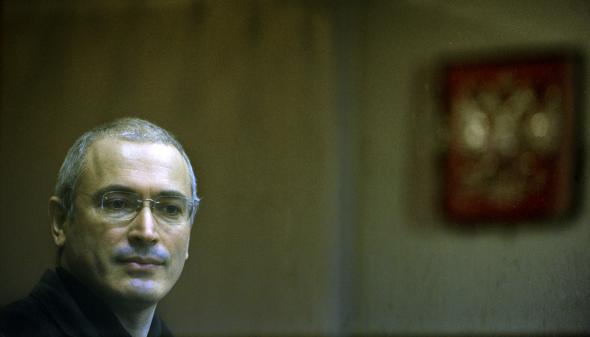If Mikhail Khodorkovsky is indeed released from prison in the next few weeks in accordance with a pardon signed by President Vladimir Putin, it is President Obama he should thank. Obama’s Tuesday announcement of the U.S. delegation to the Winter Olympics made Putin scramble to save his pet project: The prospect of standing alone, or only with the president of Ukraine for company, began to look real for the first time.
The Winter Games in Sochi are Putin’s personal project. He went to Guatemala City himself in 2007 to lobby the International Olympic Committee to choose the Black Sea resort. Many people believe he engineered his return to the presidency in 2012 in part so he could be Russia’s official leader during the games. The idea of him hosting the world’s leaders in one of his favorite Russian locations is integral to his self-image. Photos of Putin flanked by foreign heads of state, treating him with respect and deference, are important to the image he projects to the Russian public.
That is exactly why some Russian opposition activists, most notably chess champion Garry Kasparov, have been calling for a political boycott of the Olympics. “Do not come to Sochi to sit next to Putin in his stately pleasure dome, pretending it is a world apart from the police state he has created,” Kasparov wrote last summer. “Let the stadiums sit vacant, especially the VIP sections Putin hopes to fill with presidents and prime ministers.”
Western leaders were unconvinced at first that staying away made sense. Behind the scenes, there was much talk of a potential backlash. Would Putin crack down even harder if snubbed, as he did in December 2012, when Russia banned adoptions by U.S. citizens in response to the passage of the Magnitsky Act, which penalized Russian officials involved in human rights violations? While the leaders of the free world dithered, Putin kept pushing his luck. He rejected an amnesty bill that would have freed Khodorkovsky. Then Russia kidnapped about 30 Greenpeace activists in international waters and, when the Netherlands filed suit in the International Tribunal for the Law of the Sea, refused to recognize that court’s authority. Russia recently announced, in effect, that it was no longer going to recognize even the authority of the European Court of Human Rights, some of whose decisions it had been grudgingly carrying out.
This month European leaders began, carefully, to bow out of attending the Olympics. German President Joachim Gauck announced his nonattendance. The prime ministers of Poland, Belgium, and France are also skipping it. For the most part, they avoided sounding too critical of Putin: They simply said they would not be going to Sochi.
And then came Obama with the perfect snub. The delegation he announced included no high-level politicians, something that has not happened in almost two decades. At the opening ceremony, the Americans will be led by University of California President Janet Napolitano, and at the closing, by Deputy Secretary of State William Burns. And in a clear reference to the Kremlin’s anti-gay campaign, Obama included openly gay athletes: Billie Jean King, Brian Boitano (who came out shortly after the delegation was announced), and Caitlin Cahow, an ice hockey Olympian. Obama issued no comments about his choice of delegates: When one snubs, one does not engage.
Putin panicked. On Wednesday he allowed his own version of an amnesty bill, which came before parliament that day, to be amended to cover the Greenpeace activists. The following day, he said he intended to pardon Khodorkovsky. There is every indication that this was unplanned. He made the announcement after the end of his annual press conference, during an informal chat with journalists. He made reference to a clemency request that Khodorkovsky had supposedly written but of which neither his family nor his lawyers were aware. Not even the clemency officials who would have processed such a request had ever heard of it.
Does that mean there will be no backlash to the snub? Probably not. Putin’s ongoing crackdown on civil society will likely intensify significantly after the Olympic closing ceremony is over. Like a schoolyard bully who has been temporarily overpowered, Putin will lash out again as soon as he feels he can. And even if Khodorkovsky, the members of Pussy Riot, and the Greenpeace activists are released, Russia will continue to hold dozens of political prisoners.
But that is no reason not to do the right thing, like refusing to stand next to a dictator as he puts on the show of his dreams. And sometimes doing the right thing even gets some results.
